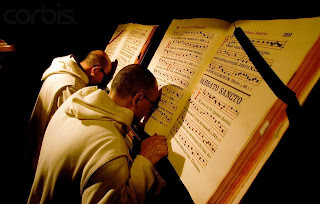
Dear Sister O'Neal, what you have written about the relationship that obtains from public profession is helpful in under-standing more of what it means to have an ecclesial vocation [isn't] it? I have read what you have written on this before but I was not so clear about legal standing creating particular binding relationships which involve the Church herself. That seems to be an important distinction between public and private commitments. It also seems light years away from legalism --- and I know you have been accused of this in the past. Have some also criticized you regarding the idea of the "security" which is built into canonical standing in regard to the eremitical vocation? Thank you for saying more about this.]]
One of the really good things about blogging and answering questions is it helps clarify and expand my own understanding of various things. Sometimes it pushes my thought in directions I might not otherwise have gone. It also means that others can help me in evaluating the conclusions I reach. Had people not written me about what they perceived as legalism, I would not have explored matters in quite the same way I have. Of course, the heart of this particular exploration stems from my own lived experience of the differences between living an eremitical life apart from canon 603 and living such a life under canon 603; still, the criticisms you mention are actually very helpful to me in reflecting on and articulating what is an amazing and paradoxical reality. I should also mention that sometimes I hear far more friendly comments on all of this from Sisters and others who really can't imagine my binding myself to a code of canons in order to live what is a very free and flexible life. Of course, they know first hand and can reflect on the place of legally binding relationships in their own lives and see how these serve to free them for ministry, education, and vocation more generally as well as how they may be constraining in ways that chafe.
Yes, the accent on the stable, legal relationships which obtain from canonical standing help to understand what ecclesial vocations are all about. Diocesan eremitical vocations are ecclesial vocations, vocations which are discerned, mediated, nurtured, and governed by the church. The point I usually accent is that of mediation because such vocations are not a matter of the person alone determining they have such a call, nor can a person receive such a call ONLY in her own heart. Such vocations, as I have written before, are mutually discerned, and further, they are mediated to the individual by the Church in the person of a legitimate authority who intends to do this in a public act of the whole Church.
The dimension which I had not focused on particularly or adequately was the dimension of the continuing stable relationships which obtain once the call (a continuing reality) is definitively mediated to the person. (Definitive mediation occurs in the rite of perpetual or solemn profession, for instance, and includes a definitive response to this call.) Not only do these relationships (with diocese, legitimate superior, monastery, community, congregation, etc) reflect the new state and relationship that exists between the individual and God, but they ensure that God's own call is a continuing reality in her life. Likewise they provide the structure necessary to allow the person to continue and grow in her response.
The criticism about the security involved in the diocesan eremitical vocation (which is actually not one I hear very much) has to be answered in light of these realities. Stable, secure relationships like those I have mentioned are part of the necessary context for exploring a life which is responsible and witnesses publicly to everyone that God alone is capable of completing and redeeming one. For the hermit in particular, they help ensure her ability to proclaim the gospel message associated with the redemption of isolation into authentic solitude. They are a way to help ensure the continuing vitality of a vocation which is God's own gift entrusted to the Church for her own well-being. In my own experience, one enters into such relationships on behalf of God and the Gospel which one's vocation represents and reveals. In any case, as already noted, the insecurity of the diocesan eremitical life is substantial; the security which obtains is at the service of God and his own purposes and does not necessarily diminish the radical insecurities which are part and parcel of the vocation. This is part of the reason, I think, that dioceses do not support c 603 hermits throughout their lives, provide residences, etc.
Having said that it should be clear that the line between the two (radical insecurities and securities) is quite fine and at points becomes somewhat artificial. Further questions need to be raised about older diocesan hermits who are ill or frail and are publicly and perpetually professed. It may well be that the radical insecurity of their vocations can be assured and still allow greater assistance from their dioceses, etc, but this is a different topic. With regard to what you have asked about however, the security of an ecclesial vocation and the relationships which are part and parcel of that serve not so much the hermit's personal security, but rather the hermit's vocational security and that of the Church's own patrimony.


















































